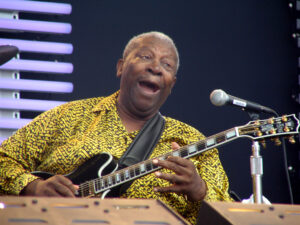King, B.B.

King, B.B.
Riley B. King was born near Itta Bena, Mississippi on 16 September 1925. Known worldwide as the “King of the Blues”, his trademark is his instantly recognizable vibrato. B.B. is not related to the other great “King” bluesmen: Albert or Freddie. B.B. was raised by his mother until age 9, when she died. He then lived with a succession of relatives, including his father, for brief time periods. He wouldn’t be known as “B.B.” until 1948.
B.B first learned to love music through church services, as the preacher would lead the singing by playing guitar. He taught B.B. a few basic chords. At 9, he was singing in a gospel group.
In his mid-teens, he began working on a plantation as a tractor driver, while continuing to singing with gospel groups, now accompanying them on guitar. In 1944, B.B. registered for selective service. The plantation owner told him he would have a better chance of receiving a deferment if he was married. B.B. married his first wife in November 1944.
In May 1946, B.B. had an accident with a tractor, breaking off the exhaust stack. Not wanting to face the owner, he left Mississippi for Memphis with $2.50 and his guitar. B.B. moved in with his cousin, Bukka White, who schooled him in the blues. In 1947, with his music career going nowhere, he moved back to the Mississippi plantation where he and his wife worked as share croppers.
In an interview in early 2005, B.B. was asked what inspired him to become a musician. He replied, “I was poor! We never had anything when I was growing up, never had our own home. I picked cotton for a dollar a day, I baled hay by hand, planted corn and soybeans. Then I was offered $3 a day to drive a tractor. But once I got better on the guitar, I could stand on Church Street in Indianola, Mississippi and make $50 or $60 in one evening. Now, why would I want to keep driving that tractor?”
In 1948, he returned to Memphis determined to become a success in the music business. There, he looked up Sonny Boy Williamson (Aleck “Rice” Miller) and convinced Sonny Boy to let him play on his radio show. Sonny Boy also passed gigs to B.B. B.B. then secured a radio gig of his own at WDIA where he worked as a DJ and played live on air. Needing a catchy name, he called himself the “Beale Street Blues Boy” which he shortened to “Blues Boy King” and eventually to “B.B. King”. His fame began to spread because of his radio show and he made his first records in 1949. He would not have his first hit until 1951: “Three O’Clock Blues.”
In a recording career that has spanned 50 years, he entered the Billboard Charts 74 times between 1951 and 1985. Arguably, he is the single most important electric blues guitarist of the last 50 years ? as rock and blues solo bent notes can be traced directly to his influence.
B.B.’s Gibson guitar, Lucille, is as famous as he is. One night in the early 1950s, he was playing in a small club. A fight broke out over a woman and a kerosene-filled garbage pail that was being used for heat was knocked over. The room turned into an inferno. Outside, B.B. realized he had left his guitar inside. He foolishly rushed back in to save it. B.B. was badly burned and almost lost his life when the building began to collapse around him. The next morning, he learned the woman’s name was Lucille. He named his guitar after her to remind himself never to do something so stupid again. Today, Gibson markets a “Lucille” model with B.B.’s endorsement.
B.B. King has said that Eric is “The Number One rock guitarist in the world. And he plays the blues better than all of us.”
Eric has shared the stage numerous times with King, since they first met in the late 1960s. B.B. has been one of Eric’s guests at all three Crossroads Guitar Festivals (2004 / 2007 / 2010). B.B. and Eric performed with Buddy Guy at Buddy’s induction to the Rock & Roll Hall of Fame in March 2005. In 1999, they teamed up for the Grammy Awards, the NAACP Image Awards and the Concert Of The Century, which took place at the White House in Washington, D.C. On October 15, 1998 B.B. walked on for the encore at Eric’s Earls’ Court, London concert. Additionally, Eric appeared on an American television salute to B.B., which was released on video as B.B. King and Friends (1988).
B.B. and Eric have also recorded together. Eric joined him in the studio for “Rock Me Baby”, which appeared on King’s 1998 album, Deuces Wild. They finally joined forces in the studio to record a CD during the early months of 2000. The result, Riding With The King, topped the charts, garnered several awards and was certified gold within three weeks of it’s release. Eric and B.B. entered the studio again in 2005 to record B.B.’s "The Thrill is Gone" for B.B.’s CD 80.
In December 2006, B.B. received the Presidential Medal of Freedom, from President George W. Bush, in recognition of his musical contributions.
B.B. King still plays well over 100 dates annually. Each June, he returns to Indianola, Missippi – near his birth place of Itta Benna – for the B.B. King Homecoming Festival. On 16 September 2008 (B.B.’s Birthday), the B.B. King Museum and Delta Interpretive Center opened in Indianola.
